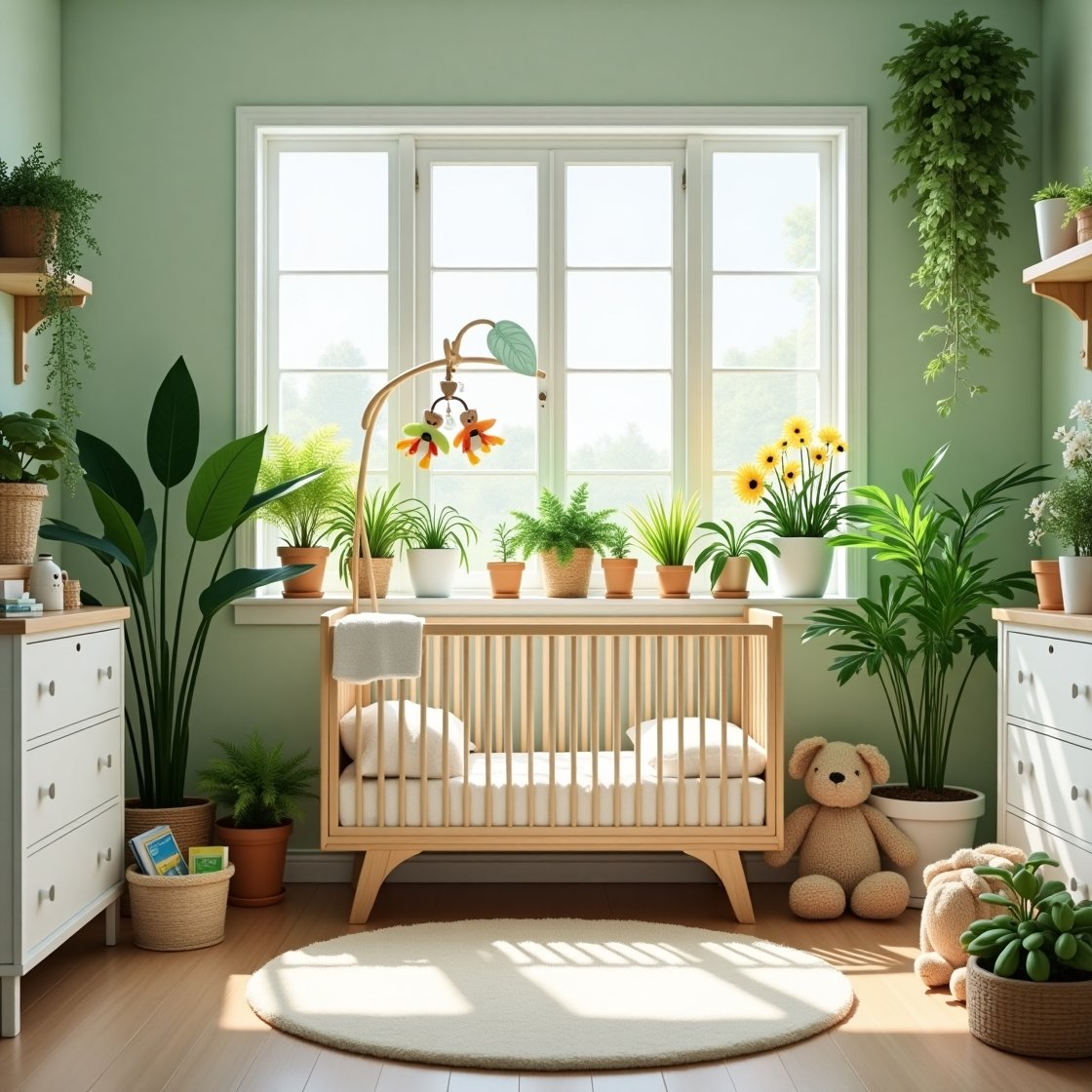Designing a nursery is a special experience — it’s about preparing a nurturing, peaceful space where a baby can grow, rest, and explore the world from day one. While soft colors and cozy textures are staples in baby room decor, indoor plants have emerged as a beautiful, calming, and health-conscious addition to nursery design.
In this article, you’ll learn how to safely and stylishly use plants in a baby’s room — from choosing non-toxic greenery to placing and styling them for maximum charm and functionality.
Why Add Plants to a Nursery?
Plants in a nursery go far beyond aesthetics. They offer real benefits for both babies and parents:
- 🌿 Air purification: Many indoor plants absorb toxins and release oxygen, improving indoor air quality.
- 💚 Natural humidity regulation: Plants help balance moisture in the room, supporting respiratory comfort.
- 🌸 Soothing visuals: Greenery is proven to calm the mind, helping babies (and parents) relax.
- 🌱 Connection to nature: Introducing natural elements at an early age fosters curiosity and well-being.
- 🧘 Stress reduction for parents: Plant care can become a mindful, calming ritual in the early parenting journey.
Important Safety Considerations
Before you start placing greenery in a nursery, safety comes first. Here’s what to keep in mind:
✅ Choose non-toxic plants
Some plants — even if beautiful — can be harmful if touched or ingested. Always verify the toxicity status of a plant using trusted sources like the ASPCA (American Society for the Prevention of Cruelty to Animals).
🚫 Avoid:
- Peace lilies
- Pothos
- Philodendrons
- Snake plants
- Aloe vera
✅ Safe Plant Options for Baby Rooms:
- Calathea: Striking foliage and completely non-toxic
- Spider plant: Hardy, non-toxic, and great for hanging
- Parlor palm (Chamaedorea): Soft fronds and air purifying
- Bamboo palm: Lush, tropical, and child-friendly
- Prayer plant (Maranta): Compact with lovely color variation
- Areca palm: Adds volume and gentle texture
Where to Place Plants in a Nursery
Plant placement matters not only for aesthetics but for baby-proofing the space. Follow these guidelines:
🌿 1. High Shelves
Perfect for spider plants or trailing varieties (as long as they’re non-toxic). Keep them out of baby’s reach and away from curious fingers.
🌿 2. Hanging Baskets
Suspend lightweight, breathable pots from the ceiling corners to fill vertical space without cluttering the floor.
🌿 3. Corner Floor Plants
Use larger non-toxic palms in a weighted pot behind a chair or next to a dresser — never close to the crib.
🌿 4. Window Ledges (with caution)
If secure and unreachable, windowsills are ideal for small, sun-loving greenery like Calatheas or Prayer plants.
⚠️ Avoid:
- Any plants placed on the crib, changing table, or within the baby’s immediate crawling reach
- Unstable pots or heavy ceramic containers
Styling Tips: Making Greenery Part of the Nursery Decor
Your baby’s room should be gentle, soft, and imaginative. Here’s how to make the plants fit seamlessly into the theme:
🎨 Match the Color Scheme
- Earthy rooms: Use terracotta or bamboo planters
- Whimsical pastels: Try white or soft pink ceramic pots
- Gender-neutral themes: Go for wood textures or neutral macramé hangers
🧺 Integrate with Accessories
- Combine plants with plush toys on shelves (as long as safe and secure)
- Pair with natural textures like linen curtains and wool rugs
💡 Lighting
Use soft LED lighting near plant areas to gently highlight greenery during nighttime feeds — avoid harsh light that could overstimulate the baby.
Creating a Calm and Healthy Atmosphere
Pairing plants with smart nursery design can improve overall sleep and comfort. Try these combinations:
- White noise + Calathea: Mimics the gentle rustle of leaves
- Low light + Spider Plant: Keeps things calm and green without bright exposure
- Natural wood furniture + Bamboo Palm: Earthy and clean
Adding just 2–3 plants in a baby’s room can make a big difference in how the space feels and functions.
Maintenance Tips for Busy Parents
New parents don’t have time for high-maintenance plant care. Keep it simple:
- Choose hardy, low-maintenance varieties
- Use self-watering pots to avoid daily watering
- Place pots on trays or coasters to prevent staining floors or furniture
- Dust leaves regularly — especially in dry rooms with heaters or AC
- Water only when the soil is dry to avoid overwatering in small, enclosed spaces
Pro Tip: Add a small chalkboard or sticker near the pot with simple care instructions.
Bonus Idea: DIY Baby Plant Projects
Make plant care a family tradition from the start:
- 🍼 Plant a “birth plant” — a Calathea or Areca Palm planted when the baby is born and watched as it grows alongside your child.
- 🎁 Gift a baby-safe plant to new parents as a thoughtful, lasting nursery decoration.
- 🧺 Create a plant-themed baby corner with books about nature, green decor, and soft plant-inspired toys.
Final Thoughts: Growing with Nature from the Beginning
Decorating a baby’s room is an opportunity to set the tone for love, health, and connection. With the right non-toxic plants and thoughtful placement, you can create a nursery that’s both functional and full of life.
From calming air purifiers to eye-catching foliage, nature offers the perfect companions for your baby’s earliest days. By introducing greenery into your nursery, you’re not just adding decor — you’re nurturing a peaceful and healthy environment where your baby can thrive.
